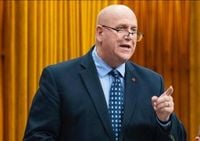Election Day in Canada has brought significant results, particularly in the Niagara West riding where incumbent Dean Allison of the Conservative Party has successfully retained his seat. The election, held on April 29, 2025, saw Allison secure a commanding lead over his Liberal challenger, Jennifer Korstanje, and the rest of the candidates.
Dean Allison, who first entered Parliament in 2004, has been a consistent figure in Niagara West, previously representing the former riding of Niagara West—Glanbrook. As of the latest reports, with 236 of 237 polls reporting, Allison garnered 36,251 votes, translating to 52.02% of the total. Korstanje followed with 29,899 votes, or 42.9%, while Justin Abando of the New Democratic Party (NDP) secured a distant third with 2,241 votes, accounting for 3.22% of the ballots cast.
This election was particularly noteworthy as it unfolded against a backdrop of a potential Liberal minority government, with the party leading or elected in 152 ridings across Canada. As per 338Canada predictions, Allison was expected to achieve over 50% of the popular vote, while Korstanje was projected to receive around 41%.
Despite the anticipated close race, the results reflected a stronghold for the Conservatives in Niagara West, where they have historically performed well. The early voting results indicated that Allison was taking a decisive lead, which seemed to solidify as the night progressed.
Jennifer Korstanje, a current Grimsby councillor, expressed optimism about her campaign despite the challenges faced during the election cycle, including online negativity. She stated, “I feel really good in the sense that I feel like it's a win no matter what, because we've run a fantastic campaign.” Korstanje emphasized the positive experiences she had while meeting constituents and the sense of community her campaign fostered. “The good people I've met, and the positive experience that they're sharing with me that they've had doing this, and just the fact that we've reunited so many people absolutely outweighs that,” she reflected.
In addition to Allison and Korstanje, the race included other candidates such as Ryan Anderson from the People’s Party and Dave Bylsma from the Christian Heritage Party, both of whom were expected to collectively receive less than 10% of the vote.
As voters headed to the polls, the Canadian Election process required them to present valid identification. Eligible voters, defined as Canadian citizens aged 18 or older, had to provide either a piece of photo ID that includes their name and address or two pieces of ID, one showing their name and another with their current address. Those without ID were still permitted to vote if they had someone vouch for their identity at the polling station.
The election results not only reflect the preferences of the voters in Niagara West but also contribute to the overall dynamics of the Canadian federal government. With the Liberals leading in a significant number of ridings, they were on track to potentially form a minority government. As of the latest updates, the Liberal Party had 8,353,653 votes, constituting 43.53% of the popular vote, compared to the Conservatives who had 7,941,765 votes, or 41.39%.
Historical context plays a significant role in understanding the electoral landscape of Niagara West. The riding has been a Conservative bastion for years, and Allison’s re-election continues this trend. His long tenure has been marked by consistent re-election, reflecting the confidence voters have in his representation.
As the day progressed and more results were reported, it became clear that the Conservatives were maintaining their foothold in Niagara West, with Allison’s performance mirroring the party's overall standing in the national election. The Bloc Québécois and the NDP also participated in the elections, with the former securing 1,223,229 votes (6.37%) and the latter 1,204,155 votes (6.27%). The Green Party, though a smaller player, managed to secure a race as well, albeit with a modest showing.
With the polls now closed and results being tallied, the focus shifts to the implications of these elections for the future of Canadian politics. As the Liberals look to form a government, the dynamics within Parliament will be influenced by the outcomes in key ridings like Niagara West.
In conclusion, Dean Allison's successful re-election in Niagara West not only underscores his popularity but also highlights the ongoing political narrative in Canada as parties vie for control in a competitive electoral landscape. As the dust settles from this election, the results will undoubtedly shape the conversations and policies moving forward in Canadian governance.





